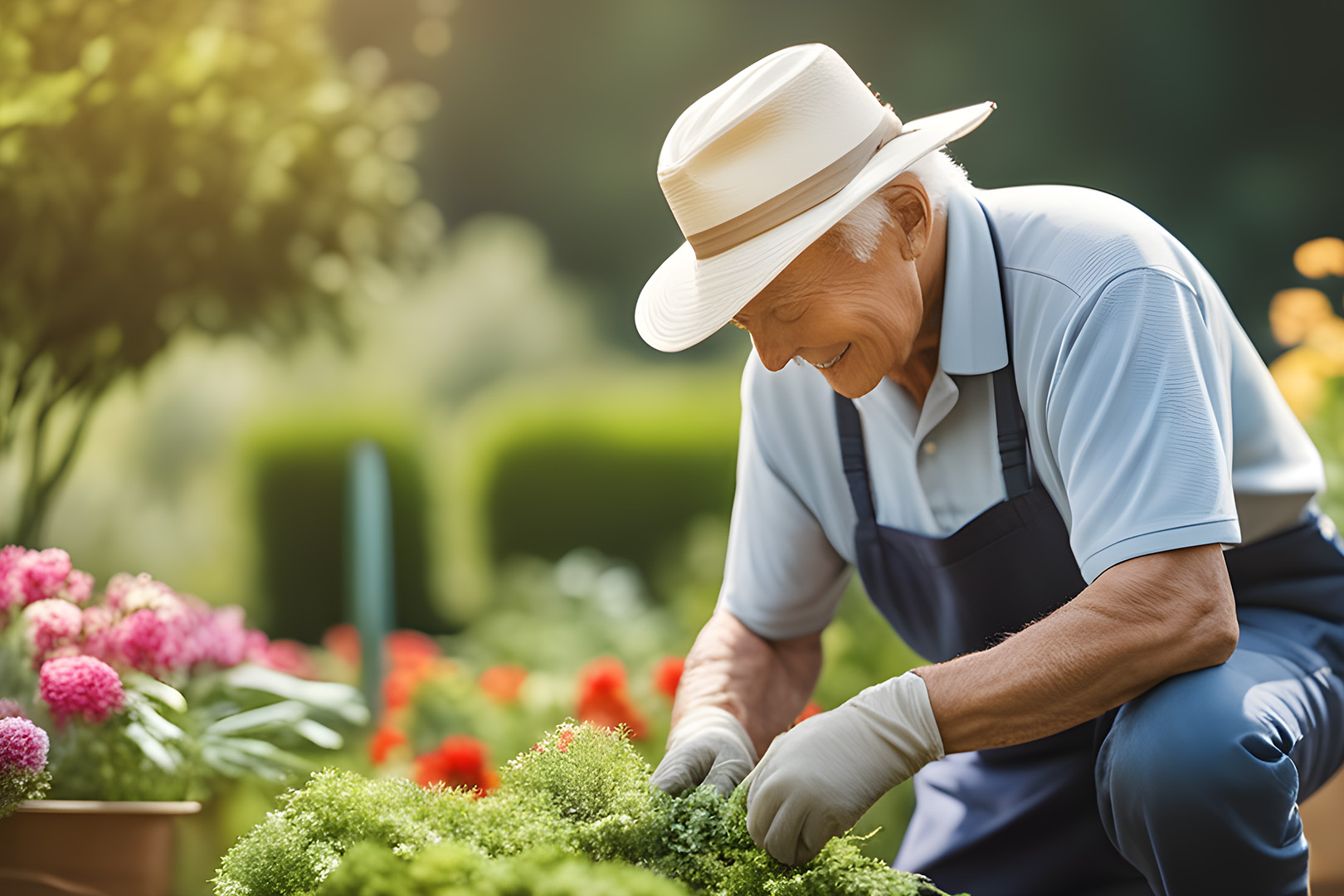As we navigate the journey of life, the act of gardening emerges as a profound and multifaceted endeavour, offering a rich tapestry of physical, mental, and emotional benefits that contribute to positive aging. The familiar phrase “April Showers bring May flowers” is a gentle reminder of the cyclical nature of life and the beauty that can emerge from challenging times. In senior care, gardening has proven to be a transformative activity, nurturing the mind, body, and spirit in ways that foster overall well-being and personal growth.
The Restorative Power of Nature
At the core of gardening lies a deep connection to nature, a sacred bond that has the power to rejuvenate and revitalize. Immersing oneself in the beauty of the natural world, tending to plants, and witnessing their growth cycles can profoundly impact the human spirit, fostering a sense of tranquillity, wonder, and gratitude.
- Stress Reduction: The calming effects of nature and the sense of accomplishment from nurturing plants can serve as a potent antidote to stress and anxiety, promoting relaxation and inner peace.
- Access to Nature: Gardening allows individuals to spend time outdoors, connecting with nature and benefiting from its restorative effects, which have been scientifically proven to boost mood and overall well-being.
- Sensory Stimulation: The sights, sounds, and scents of a garden can awaken the senses, providing a rich and immersive experience that grounds individuals in the present moment, fostering mindfulness and appreciation for the simple pleasures of life.
Cultivating Physical Vitality
Gardening is not merely a leisure activity; it is a gentle yet effective form of exercise that can contribute to physical vitality and overall health. By engaging in gardening tasks, individuals can reap a multitude of physical benefits that support positive aging:
- Gentle Exercise: Gardening activities such as digging, planting, and pruning provide gentle exercise, improving flexibility, strength, and balance, which is essential for healthy aging.
- Promoting Mobility: The act of bending, reaching, and stretching while gardening can help maintain and improve joint mobility, reducing the risk of falls and promoting independence.
- Cardiovascular Health: The physical exertion in gardening tasks can elevate heart rates, improving cardiovascular health and endurance.
Nurturing Mental Acuity
Beyond the physical realm, gardening also offers a wealth of cognitive benefits that can help keep the mind sharp and engaged, fostering mental acuity and overall cognitive well-being:
- Mental Stimulation: Gardening requires problem-solving, planning, and creativity, keeping the mind active and engaged, which can help maintain cognitive function and potentially delay the onset of age-related cognitive decline.
- Sense of Accomplishment: Witnessing the fruits of one’s labour, from seed to bloom, can provide a profound sense of accomplishment and pride, boosting self-esteem and confidence.
- Learning Opportunities: Gardening provides continuous learning as individuals explore new plant varieties, cultivation techniques, and environmental factors, fostering intellectual curiosity and growth.
Cultivating Social Connections
Gardening is not merely a solitary pursuit; it can also be a vibrant social activity that fosters connections and strengthens bonds within communities:
- Shared Interests: Gardening can bring together individuals who share similar interests, creating a sense of camaraderie and providing opportunities for meaningful interactions and knowledge exchange.
- Intergenerational Bonding: Gardening can be a shared activity across generations, promoting bonding and knowledge transfer between elders and younger generations, fostering a sense of continuity and preserving cultural traditions.
- Community Involvement: Participation in community gardens or gardening clubs can foster a sense of belonging and social integration, combating feelings of isolation and loneliness that can sometimes accompany aging.
Nourishing Mind, Body, and Soul
In addition to the physical, mental, and social benefits, gardening also holds the potential to nourish the soul, providing a sense of purpose, emotional fulfillment, and a deeper connection to the natural world:
- Sense of Purpose: Gardening provides a sense of responsibility and purpose, promoting feelings of fulfillment and contribution, which can be particularly meaningful for older adults seeking meaningful engagement.
- Emotional Fulfillment: Nurturing and caring for plants can evoke a sense of joy, pride, and emotional satisfaction, contributing to overall emotional well-being and life satisfaction.
- Nutritional Benefits: Growing one’s own fruits and vegetables can provide access to fresh, healthy produce, support overall well-being, and promote a sense of self-sufficiency and independence.
At the heart of our approach lies a deep understanding that gardening is more than just a hobby; it is a gateway to personal growth, connection, and overall well-being. By embracing the restorative power of nature and cultivating an environment that nurtures the mind, body, and soul, we strive to empower our residents and clients to embark on a journey of positive aging, one where the beauty and magic of gardening can flourish and enrich their lives in profound and lasting ways.
Cultivate Joy Through Gardening with Home Instead
Experience the therapeutic benefits of gardening and nurture your well-being. Our compassionate caregivers provide personalized support to help you embrace your passion for gardening while promoting independence and fulfillment.
Discover our gardening assistance services by contacting our Home Instead Senior Care East Toronto office.







